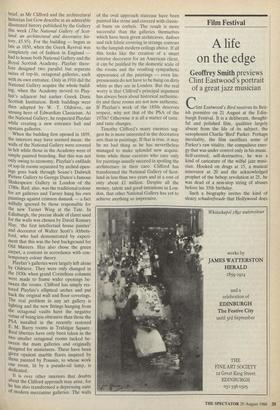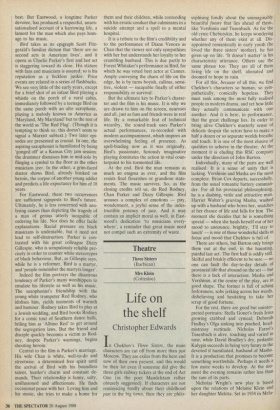Film Festival
A life on the edge
Geoffrey Smith previews Clint Eastwood's portrait of a great jazz musician
Clint Eastwood's Bird receives its Brit- ish premiere on 21 August at the Edin- burgh Festival. It is a deliberate, thought- ful and polished film, qualities largely absent from the life of its subject, the saxophonist Charlie 'Bird' Parker. Perhaps inevitably, the film sacrifices some of Parker's raw vitality, the compulsive ener- gy that was under control only in his music. Self-centred, self-destructive, he was a kind of caricature of the wilful jazz musi- cian. Hooked on drugs at 15, a musical innovator at 20 and the acknowledged prophet of the bebop revolution at 25, he was dead of a non-stop string of abuses before his 35th birthday.
Such a biography invites the kind of sleazy schadenfreude that Hollywood does best. But Eastwood, a longtime Parker devotee, has produced a respectful, unsen- sationalised account of a harrowing life, a lament for the man which also pays hom- age to his music.
Bird takes as its epigraph Scott Fitz- gerald's familiar dictum that 'there are no second acts in American lives', and it opens as Charlie Parker's first and last act is staggering toward its close. His stature with fans and musicians is assured; so is his reputation as a feckless junkie. Prior events are related in a series of flashbacks. We see very little of the early years, except for a brief shot of an infant Bird playing a whistle on the porch of a rural cabin, immediately followed by a teenage Bird on the same porch with an alto saxophone, playing a melody known in America as `Maryland, My Maryland' but to the rest of the world as 'The Red Flag'. (Though it is tempting to think so, this doesn't seem to signal a Marxist subtext.) Two later epi- sodes are presented as crucial. In one, the aspiring saxophonist is humiliated by being `gonged off' at a Kansas City jam session: the drummer dismisses him in mid-solo by flinging a cymbal to the floor as the other musicians jeer. In the other, a grim-faced doctor shows Bird, already hooked on heroin, the corpse of another young addict and predicts a life expectancy for him of 18 years.
For Eastwood, these two occurrences are sufficient signposts to Bird's future. Ultimately, he is less concerned with ana- lysing causes than depicting the tragedy of a man of genius utterly incapable of ordering his life. Nor does he offer facile explanations. Racial pressure on black musicians is undeniable, but it need not lead to self-destruction. Parker is con- trasted with his great colleague Dizzy Gillespie, who is scrupulously reliable pre- cisely in order to counter white stereotypes of black behaviour. But, as Gillespie says, while he is a reformer, Bird is a martyr, and 'people remember the martyrs longer'.
Indeed the film portrays the disastrous tendency of Parker's many worshippers to emulate his lifestyle as well as his music. The saxophonist's friendship with the young white trumpeter Red Rodney, who idolises him, yields moments of warmth and humour. Rodney takes Bird to play at a Jewish wedding, and Bird books Rodney for a comic tour of Southern dance halls, billing him as 'Albino Red' to get around the segregation laws. But the friend and disciple quickly becomes a victim as Rod- ney, despite Parker's warnings, begins shooting heroin.' Central to the film is Parker's marriage. His wife Chan is white, well-to-do and streetwise, a determined free spirit until the arrival of Bird with his boundless talent, hustler's charm and constant de- mands. Their relationship is funny, salty, unillusioned and affectionate. He finds occasional peace with her. Loving him and his music, she tries to make a home for them and their children, while contending with his erratic conduct that culminates in a suicide attempt and a spell in a mental hospital.
It is a tribute to the film's credibility and to the performance of Diane Venora as Chan that the viewer not only sympathises with her but understands her loyalty to her crumbling husband. This is due partly to Forest Whitaker's performance as Bird, for which he was voted best actor at Cannes. Amply conveying the chaos of life on the edge, he is by turns boyish, callous, sensi- tive, violent — incapable finally of either responsibility or survival.
But the ultimate key to Parker's charac- ter and the film is his music. It is why we are drawn to him on the screen, neuroses and all, just as fans and friends were in real life. By a remarkable feat of technical wizardry, the sound-track uses Parker's actual performances, re-recorded with modern accompaniment, which inspires an overwhelming feeling of presence. As spell-binding now as it was originally, Bird's passionate, furiously imaginative playing dominates the action in vital coun- terpoint to his tormented life.
At the end, Bird the man remains as much an enigma as ever, and the film resists final flourishes or grandiose state- ments. The music survives. So, as the closing credits tell us, do Red Rodney, Chan Parker and Dizzy Gillespie. Bird arouses a complex of emotions — pity, wonderment, a joyful sense of the indes- tructible potency of jazz. And it may contain an implicit moral as well, in East- wood's dedication `to musicians every- where', a reminder that great music need not compel such an extremity of waste.























































 Previous page
Previous page